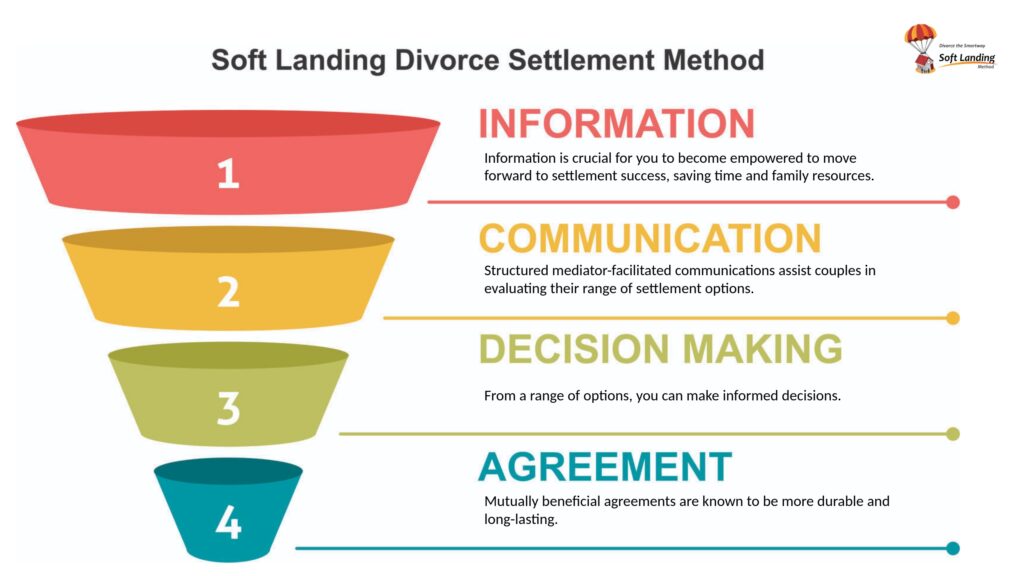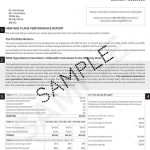The ‘Without Prejudice’ Rules Empowers Resolution

Get Acquainted Call
Do you want a Soft Landing?
Have a few questions?
Learn More:
Schedule a 15-Minute Complimentary Call
Without Prejudice, a key tenet in mediation, protects statements made during negotiations, allowing couples like Richard and Jane, married for 23 years, to discuss their issues openly without the fear of legal repercussions. This is especially important in existing disputes, where both parties might otherwise be hesitant to share their true feelings and concerns. Understanding this concept can significantly impact the outcome of the mediation process, leading to more effective and mutually beneficial agreements.
In this blog post, we will delve deeper into what “Without Prejudice” means in the context of divorce mediation, its public policy implications, and why it is a cornerstone of legal advice in dispute resolution. By the end, you will have a clear understanding of how this principle can help you navigate your separation with dignity and compassion, ensuring the best possible outcome for all involved. Read on to learn more about how “Without Prejudice” can be a powerful tool in your divorce mediation journey.
Real Without Prejudice Conversations
Understanding the “Without Prejudice” principle is just the beginning of how it can impact your divorce mediation process. Let’s illustrate how this concept plays out in real conversations between couples undergoing mediation.
For example, consider Richard and Jane, a couple married for 23 years, who are navigating their own divorce. Their dialogue highlights the practical applications of the “Without Prejudice” rule and how it fosters an environment conducive to honest and open communication. This rule not only alleviates their fears of potential legal repercussions but also empowers them to negotiate sincerely and find common ground.
Richard: Jane, have you heard about the “Without Prejudice” rule in divorce mediation?
Jane: I’ve come across the term, but I’m not entirely sure what it means. Can you explain it to me?
Richard: Sure! The “Without Prejudice” rule is a legal term that basically means any communication marked this way can’t be used in court later. It allows us to speak openly and honestly during mediation without worrying that our words will be used against us if we go to court.
Jane: That sounds useful. How exactly does it work?
Richard: Well, when we label a letter or discussion as “Without Prejudice,” it means we’re trying to settle our dispute in good faith. This encourages honest communication because it protects any admissions or compromises we make during mediation. If our negotiations break down and we end up in court, these discussions can’t be used as evidence.
Jane: So, it helps us feel more secure about negotiating?
Richard: Exactly. It gives us the confidence to negotiate sincerely, knowing that we won’t be penalized for being open. This is important because reaching a settlement often means admitting that the other party might be right about something or compromising on some tough issues.
Jane: What happens if we don’t label our discussions as “Without Prejudice”?
Richard: The content and intention behind the communication are what truly matter. Even if we forget to mark it as “Without Prejudice,” as long as it’s part of a genuine attempt to settle, the rule can still apply. But to avoid any confusion or disputes about our intentions, it’s best to label it clearly.
Jane: Are there any variations to this rule?
Richard: Yes, there are. One common variation is “Without Prejudice Save As to Costs,” which means that while the communication can’t be used to determine the case, it can be used when the court decides who should pay the legal costs. This shows that one party was willing to settle, which can influence the court’s decision on costs.
Jane: Are there any exceptions where the “Without Prejudice” rule wouldn’t apply?
Richard: There are a few exceptions. For instance, if the communication includes evidence of a crime, fraud, or misrepresentation, the court may allow it as evidence. Also, if there’s a public interest at stake or if applying the rule would lead to overcompensation, the court might set it aside. And of course, if we both agree to waive the rule, it won’t apply.
Jane: This makes a lot of sense now. It sounds like using “Without Prejudice” can really help us negotiate more effectively and confidently.
Richard: Definitely. It’s all about fostering an environment of trust and open communication, which is crucial for a successful mediation.
Jane: That makes me feel a lot better about the mediation process. It’s good to know we can talk openly without everything being used against us if things don’t work out.
Richard: Exactly. And this approach is especially helpful in mediation because it encourages both parties to find common ground without fear of legal repercussions.
Jane: What if we do come to an agreement during mediation? How do we make sure it’s solid?
Richard: Once we reach an agreement, we can draft a formal settlement document. It’s important to review it carefully and ensure it covers all the points we discussed. Then, we can both sign it, and it will become a binding agreement.
Jane: Can anything from our “Without Prejudice” discussions be included in that settlement document?
Richard: Yes, absolutely. The final settlement document will include the terms we agreed upon during our “Without Prejudice” discussions. However, once the terms are in the formal agreement and we’ve both signed it, they are no longer protected by the “Without Prejudice” rule.
Jane: That makes sense. So, we can be open during discussions and then make everything official once we’re in agreement.
Richard: Exactly. And if we ever have any doubts or need clarification, it’s always a good idea to consult with our mediator or a legal professional. They can provide guidance and ensure everything is in order.
Jane: Thanks, Richard. I feel much more confident about this now. Understanding how “Without Prejudice” works really helps.
Richard: I’m glad to hear that, Jane. Mediation can be a positive and productive way to resolve our differences, and knowing about these rules just makes the process smoother and more effective.
Jane: Absolutely. Let’s make the most of this opportunity to settle things amicably.
Richard: Agreed. We’ll navigate this together and come out with a fair and balanced resolution.
7 Key Takeaways
Definition of ‘Without Prejudice’:
The term “Without Prejudice” means that statements made during mediation cannot be used as evidence in court. This encourages open and honest communication between parties.
Encouraging Open Dialogue:
By ensuring that discussions cannot be used against them, parties are more likely to speak freely, facilitating a more productive mediation process.
Settlement Privilege:
The “Without Prejudice” rule supports settlement privilege, which aims to promote the settlement of disputes without the fear of compromising one’s legal position.
Application in Divorce Mediation:
In Ontario, this principle is particularly valuable in divorce mediation, helping couples reach amicable settlements without litigation.
Legal Protections:
Statements made “Without Prejudice” are protected by law, providing a safe space for negotiation and resolution of issues like property division and child custody.
Impact on Court Proceedings:
If mediation fails and the case goes to court, anything said under “Without Prejudice” remains inadmissible, protecting the integrity of the mediation process.
Benefits of Mediation:
Mediation, supported by the “Without Prejudice” principle, often results in faster, less expensive, and less adversarial resolutions compared to traditional litigation, benefiting all parties involved.
Example of an Interim Without Prejudice Order in Family Law
Scenario:
John and Jane are divorcing. They have two children, ages 8 and 10. While the divorce proceedings are ongoing, immediate issues need to be addressed, such as child custody, child support, and spousal support.
Interim Without Prejudice Order:
Court Order Summary:
- Parties Involved: John Doe (Petitioner) and Jane Doe (Respondent)
- Children: Two minors, ages 8 and 10
1. Child Custody and Access:
- Temporary Custody: Jane is granted temporary custody of the children.
- Visitation Rights: John is granted visitation rights every weekend from Friday 5 PM to Sunday 5 PM.
- Holidays: The parents will alternate holidays, starting with John having the children for the upcoming holiday.
2. Child Support:
- Interim Support: John must pay Jane $1,000 monthly for child support.
- Effective Date: Payments start on the first of the month following the date of this order.
- Review Clause: The amount of child support is subject to review and adjustment once the final financial disclosures are made.
3. Spousal Support:
- Interim Support: John is ordered to pay Jane $500 monthly for spousal support.
- Duration: This arrangement is temporary and will be reviewed at the next court hearing.
4. Property Use:
- Family Home: Jane and the children will remain in the family home until a final decision is made.
- Expenses: John will continue to pay the mortgage and utility bills for the family home.
5. Legal Fees:
- Temporary Order: Each party will bear their legal fees until further notice.
Without Prejudice Clause:
- No Precedent: This interim order does not set a precedent for the final judgment.
- Reviewable: The terms of this order can be reviewed and modified as more information becomes available or circumstances change.
- No Admission: Neither party admits to fault or liability by agreeing to this interim order.
Key Points:
- Temporary Nature: This order provides immediate relief and structure until the final hearing.
- No Impact on Final Decision: The terms of this order will not influence the final custody, support, or property decisions.
- Flexibility: The court retains the right to modify the terms as the case progresses and more information is available.
This example demonstrates how an interim without prejudice order can address urgent family law matters, ensuring stability and fairness during divorce without affecting the final outcome.
Final Thoughts
Jane and Richard’s conversation clearly illustrates how the “Without Prejudice” rule can be practically applied to divorce mediation. This rule is designed to create a safe space for open dialogue and reduce the anxiety that often accompanies sensitive discussions about finances, property, and child custody.
This principle greatly benefits the mediation process, as it encourages both parties to communicate more openly without the fear of legal repercussions. Richard and Jane can discuss their issues honestly, knowing that their words will not be used against them in court if the mediation does not result in a settlement. This fosters an environment of trust and cooperation, which is essential for effective mediation.
As they navigate their discussions, Richard and Jane can explore various settlement options more freely. They can acknowledge areas where they might need to compromise and understand each other’s perspectives better. The ‘Without Prejudice’ rule thus becomes a powerful tool in helping them reach a fair and balanced resolution, ensuring that both parties feel valued, heard, and respected.
Understanding the nuances of the “Without Prejudice” rule also helps couples like Richard and Jane feel more secure about the mediation process. They can confidently approach negotiations, knowing they have the freedom to explore different solutions without fear of future legal implications.
In conclusion, the “Without Prejudice” principle is crucial in divorce mediation by promoting honest and open communication. It helps couples like Richard and Jane navigate their separation with dignity and compassion, ultimately leading to more effective and mutually beneficial agreements. As you embark on your mediation journey, remember the importance of this principle and how it can help you achieve a positive outcome for all involved.
At DTSW

We understand that you’re navigating a challenging period in your life. The complexities of divorce and settlement discussions can often feel overwhelming. That’s why our team of Family Mediators and Accredited Divorce Financial Analysts at Divorce The Smart Way (DTSW) is here to guide you through this process. We recognize the importance of open and sincere communication during these times and are committed to creating a safe and supportive environment for you to express your concerns and explore potential solutions.
Our Soft Landing Divorce Settlement Method is designed to transform difficult situations into opportunities for growth and understanding. We don’t just help you reach a settlement; we ensure you understand every step of the process. We’ll guide you through the financial implications of your decisions, protecting your rights and empowering you to make informed decisions that will shape your future.
We know every situation is unique, and we’re ready to tailor our approach to meet your specific needs. Whether you’re at the beginning of a dispute or already engaged in settlement discussions, we’re here to help. Don’t navigate this journey alone. Reach out to us and let us guide you through this challenging time.
We invite you to Schedule a Get Acquainted Call with our team. In this call, we can discuss your situation, answer your questions, and determine how our services might benefit you. Don’t leave your future to chance; understand your rights and make informed decisions. Contact us today to get started.
Schedule a Get Acquainted Call today and take the first step towards a more peaceful and secure future.
Get Acquainted Call
Do you want a Soft Landing?
Have a few questions?
Learn More:
Schedule a 15-Minute Complimentary Call
External Links:
- Can your spouse use your settlement talks against you in court? | Family Law in BC: This link provides information on how settlement talks can be used in court, especially in the context of family law.
- Epstein’s This Week in Family Law | Without Prejudice | Westlaw Canada Portal: This link provides a weekly update on family law issues, including the use of “without prejudice” in communications.
- ASK A LAWYER: What does ‘without prejudice’ mean, anyway? – Sullivan Law: This link provides a lawyer’s perspective on the meaning of “without prejudice”.
- The Meaning of “Without Prejudice” – Lawyer for Children’s Aid Cases defending parents in CAS Claims: This link provides a detailed explanation of the term “without prejudice” from a lawyer’s perspective.
- The Basics: What does “without prejudice” mean and when do I need to use it?: This link provides a basic guide on the meaning of “without prejudice” and when to use it.
- With Prejudice” vs. “Without Prejudice” – Lexology: This link provides a comparison between “with prejudice” and “without prejudice” in the context of legal disputes.
Ken Maynard CDFA, Acc.FM
I assist intelligent and successful couples in crafting rapid, custom separation agreements that pave the way for a smooth transition towards a secure future. This efficient process is achieved in about four meetings, effectively sidestepping the excessive conflicts, confusion, and costs commonly linked to legal proceedings. Clients have the flexibility to collaborate with me either via video conference or in-person through a DTSW associate at any of our six Greater Toronto mediation centers, located in Aurora, Barrie, North York, Vaughan, Mississauga, and Scarborough.
Have a few questions - Tap here to Schedule a Get Acquainted Call
- Ken Maynard CDFA, Acc.FMhttps://divorcethesmartway.ca/author/wardman/June 2, 2022
- Ken Maynard CDFA, Acc.FMhttps://divorcethesmartway.ca/author/wardman/May 20, 2022
- Ken Maynard CDFA, Acc.FMhttps://divorcethesmartway.ca/author/wardman/June 1, 2023

















































